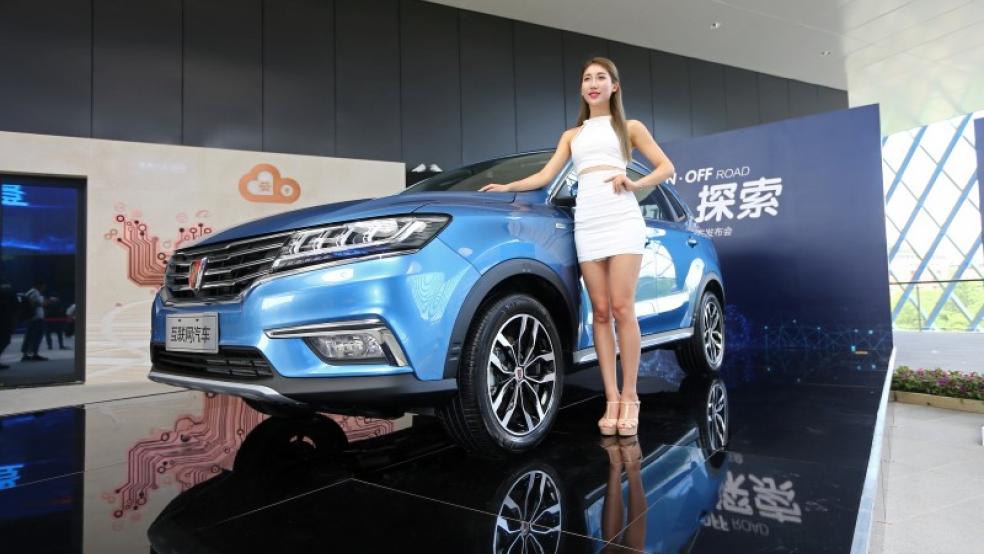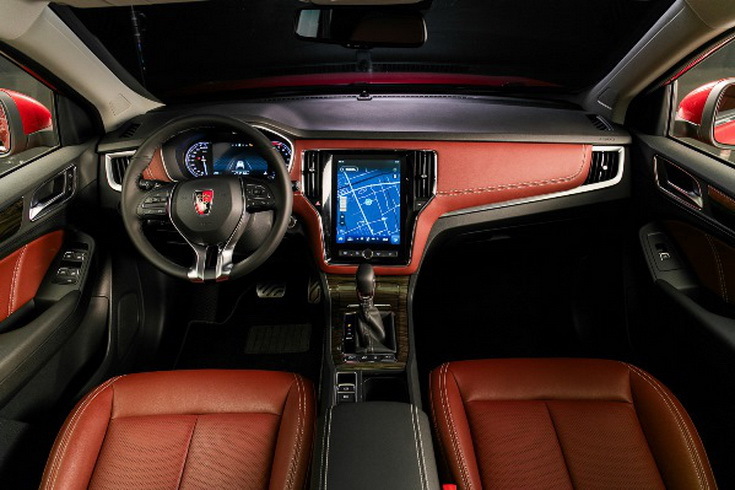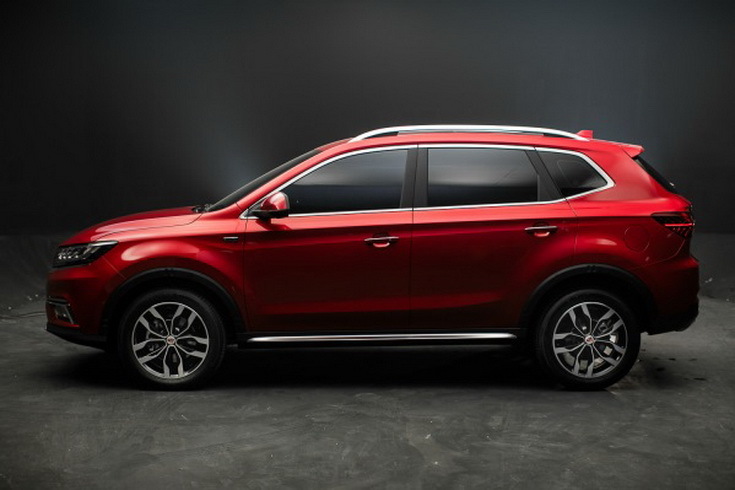Chinese IT giant Alibaba announced the launch of pre-orders for a smart "Internet-car" of its own design
After the headlights of cars with intelligent on-board systems were seen from the near future, many companies of the IT segment were actively involved in the creation of software and hardware elements of such systems and making their proposals for future and existing concepts of leading automotive companies.
The largest Chinese online retailer in B2B sales, IT giant Alibaba Group did not focus on the "little things" and presented its own concept - the OS'Car RX5 crossover, created in conjunction with the largest Chinese automaker SAIC Motor Corp. - the first joint development of Alibaba and SAIC. The main focus of the development is on the integration of the concept into the IoT ecosystem and the use of the enormous potential of the commercial platform Alibaba, this time in the automotive sector.

Externally, the petrol OS'Car RX5 (Roewe RX5) looks quite ordinary and is no different from other members of this segment, in particular, the Volvo XC90. But appearance, as is known, is deceptive. The most interesting is implemented at the level of the technical concept of the novelty. RX5 is equipped with three LCD displays that provide access to the capabilities of the operating system and full interactive communication. Those interested can install up to four additional cameras in the cabin for taking photos and videos. On-board vehicle systems support voice control. Interestingly, the proposed version of the vehicle positioning system, as explained by representatives of the company, is able to cope with their tasks without using GPS and Wi-Fi resources. Autopilot in the RX5 is not provided - rational and cautious Chinese, apparently with an eye on the global statistics on the use of autonomous vehicles, while decided to postpone its implementation.
')

“While other companies are limiting themselves to what the“ internet in the car ”does, our ultimate goal is to make our car part of the IoT ecosystem, where smart devices collect and share data that is useful to users. A good operating system is a second car engine, and data is a new fuel. I am convinced that in the future cars will have more opportunities for the introduction of "smart" software and hardware development "- summarized mr. Wang Jian, Alibaba Technology and Innovation Committee Chair.
One of the advantages of the novelty, the development of which took a total of about two years - connecting the onboard system to the Internet using the capabilities of the OS YunOS . Recall that YunOS (AliyunOS) is developed by AliCloud, a division of the Alibaba Group, which has established itself as a developer of applications for medical equipment, smartphones, tablets, smart watches and a wide range of household appliances, including refrigerators, air conditioners and robotic vacuum cleaners, with an emphasis on the idea of implementation cloud functionality into mobile devices.
The company expects that, thanks to the integration into the general network, all connected cars will be able to quickly exchange useful information among themselves, thus becoming part of a single IT ecosystem. On the other hand, using the personal identifier of the owner and the capabilities of the onboard OS'Car RX5 system, Alibaba expects to adapt its functions as flexibly and effectively to the requirements and preferences of each particular driver.
Using voice commands and an intelligent onboard system menu, the owner of the RX5 will be able to book a parking space, pay for gas station services, or, for example, a cup of coffee using the Alipay payment system. Taking into account the preferences of its owner, the on-board computer will be able to recommend music selections, catering establishments, maintain an optimal microclimate in the cabin, etc.

The openness of the OS in the RX5 to the developers of other companies will create ideal conditions for the further development of the very concept of a smart “Internet car”. As Zhang Chunhui, President of YunOS, noted: “In the future, we imagine a machine connected to the Internet based on the largest open platform capable of providing access to all types of services, both within YunOS itself and within solutions from third-party developers.” "... We hope that cars connected to the Internet will become a solid foundation for developing the infrastructure of smart transport, as part of the smart megapolis ecosystem."
Although the RX5 cannot yet be classified as a completely unmanned vehicle and is equipped with a 1.5L or 2.0-liter turbocharged gasoline engine, the car attracts at a price, and, according to Alibaba, is 100% ready for operation within the framework of the developed concept. The start of sales will take place next month.

And, nevertheless, OS'Car RX5, according to company representatives, will be the first affordable smart vehicle integrated into the IoT ecosystem. In the basic configuration, the cost of the car starts from 148,800 yuan ($ 22,300). Pre-ordering a car is possible through Tmall today.
***
Despite the attractiveness of the proposed solutions, it is somewhat unclear why the developers, having all the material and intellectual resources, focused on improving the characteristics of the gasoline unit, and did not equip the new product with an environmentally safe and promising electric motor. This is all the more strange given the personal position of Jack Ma (Ma Yuan) - the chairman of the board of directors of the Alibaba Group, consistently upholding the priority of green technologies and an active fighter for the preservation of natural resources. It remains to hope that as part of the further development of the concept of the car, as one of the elements of the ecosystem, the concept will be refined in accordance with the requirements of today and the general strategic line of the IT giant.
Alibaba is not the only Chinese company developing the concept of a smart car with the prospect of autopilot. So among the innovators in the market of China, the IT giant Baidu, testing self-propelled vehicles in China and the United States. This is the Chinese IT-corporation LeEco, which recently introduced LeSEE - the concept of a self- driving electric sedan equipped with a folding steering wheel. These are futuristic projects of the Faraday Future American-Chinese startup, implemented with the support of the same LeEco, this is a young Chinese company Zhiche Auto , founded in 2014 and has already managed to demonstrate the Zhiche Auto electric crossover, almost ready for commercial launch, and others.
The idea of integrating the car into the global IoT space, successfully implemented by pioneer Jack Ma in OS'Car RX5, has already been taken up by a number of leading manufacturers. So in July 2016, a memorandum of intent was signed between the leadership of the Volkswagen concerns and LG Electronics. According to the document, the companies plan to develop a new platform for cars using cloud technologies to expand the possibilities of data exchange between vehicles.
It is planned that the system being created in the future will give drivers access to other various functions. This will be the ability to control and monitor various household devices - from security devices and systems that support indoor comfort - to small household appliances connected to a single ecosystem.
As part of a promising development, companies are also planning to integrate the latest information and entertainment technologies, create and implement an interface for the exchange of secure notifications and messages, and include an electronic assistant in the system to advise the driver on real-time issues.
Press release on ( Alizila.com )
That's all with you was Dronk.Ru. Do not forget to return money for purchases in China and subscribe to our blog , there will be many more interesting things.

We recommend:
- Save up to 8% on every purchase on AliExpress and other online stores in China
- Why do online stores give money for purchases?
- Return your money - Choose a cashback service for Aliexpress
- The history of the development of Dronk.ru - from choosing quadcopters to returning money for purchases on AliExpress and not only
- The best cashback service or 5 main criteria for evaluating cashback service
The largest Chinese online retailer in B2B sales, IT giant Alibaba Group did not focus on the "little things" and presented its own concept - the OS'Car RX5 crossover, created in conjunction with the largest Chinese automaker SAIC Motor Corp. - the first joint development of Alibaba and SAIC. The main focus of the development is on the integration of the concept into the IoT ecosystem and the use of the enormous potential of the commercial platform Alibaba, this time in the automotive sector.

Externally, the petrol OS'Car RX5 (Roewe RX5) looks quite ordinary and is no different from other members of this segment, in particular, the Volvo XC90. But appearance, as is known, is deceptive. The most interesting is implemented at the level of the technical concept of the novelty. RX5 is equipped with three LCD displays that provide access to the capabilities of the operating system and full interactive communication. Those interested can install up to four additional cameras in the cabin for taking photos and videos. On-board vehicle systems support voice control. Interestingly, the proposed version of the vehicle positioning system, as explained by representatives of the company, is able to cope with their tasks without using GPS and Wi-Fi resources. Autopilot in the RX5 is not provided - rational and cautious Chinese, apparently with an eye on the global statistics on the use of autonomous vehicles, while decided to postpone its implementation.
')

“While other companies are limiting themselves to what the“ internet in the car ”does, our ultimate goal is to make our car part of the IoT ecosystem, where smart devices collect and share data that is useful to users. A good operating system is a second car engine, and data is a new fuel. I am convinced that in the future cars will have more opportunities for the introduction of "smart" software and hardware development "- summarized mr. Wang Jian, Alibaba Technology and Innovation Committee Chair.
One of the advantages of the novelty, the development of which took a total of about two years - connecting the onboard system to the Internet using the capabilities of the OS YunOS . Recall that YunOS (AliyunOS) is developed by AliCloud, a division of the Alibaba Group, which has established itself as a developer of applications for medical equipment, smartphones, tablets, smart watches and a wide range of household appliances, including refrigerators, air conditioners and robotic vacuum cleaners, with an emphasis on the idea of implementation cloud functionality into mobile devices.
The company expects that, thanks to the integration into the general network, all connected cars will be able to quickly exchange useful information among themselves, thus becoming part of a single IT ecosystem. On the other hand, using the personal identifier of the owner and the capabilities of the onboard OS'Car RX5 system, Alibaba expects to adapt its functions as flexibly and effectively to the requirements and preferences of each particular driver.
Using voice commands and an intelligent onboard system menu, the owner of the RX5 will be able to book a parking space, pay for gas station services, or, for example, a cup of coffee using the Alipay payment system. Taking into account the preferences of its owner, the on-board computer will be able to recommend music selections, catering establishments, maintain an optimal microclimate in the cabin, etc.

The openness of the OS in the RX5 to the developers of other companies will create ideal conditions for the further development of the very concept of a smart “Internet car”. As Zhang Chunhui, President of YunOS, noted: “In the future, we imagine a machine connected to the Internet based on the largest open platform capable of providing access to all types of services, both within YunOS itself and within solutions from third-party developers.” "... We hope that cars connected to the Internet will become a solid foundation for developing the infrastructure of smart transport, as part of the smart megapolis ecosystem."
Although the RX5 cannot yet be classified as a completely unmanned vehicle and is equipped with a 1.5L or 2.0-liter turbocharged gasoline engine, the car attracts at a price, and, according to Alibaba, is 100% ready for operation within the framework of the developed concept. The start of sales will take place next month.

And, nevertheless, OS'Car RX5, according to company representatives, will be the first affordable smart vehicle integrated into the IoT ecosystem. In the basic configuration, the cost of the car starts from 148,800 yuan ($ 22,300). Pre-ordering a car is possible through Tmall today.
***
Despite the attractiveness of the proposed solutions, it is somewhat unclear why the developers, having all the material and intellectual resources, focused on improving the characteristics of the gasoline unit, and did not equip the new product with an environmentally safe and promising electric motor. This is all the more strange given the personal position of Jack Ma (Ma Yuan) - the chairman of the board of directors of the Alibaba Group, consistently upholding the priority of green technologies and an active fighter for the preservation of natural resources. It remains to hope that as part of the further development of the concept of the car, as one of the elements of the ecosystem, the concept will be refined in accordance with the requirements of today and the general strategic line of the IT giant.
Alibaba is not the only Chinese company developing the concept of a smart car with the prospect of autopilot. So among the innovators in the market of China, the IT giant Baidu, testing self-propelled vehicles in China and the United States. This is the Chinese IT-corporation LeEco, which recently introduced LeSEE - the concept of a self- driving electric sedan equipped with a folding steering wheel. These are futuristic projects of the Faraday Future American-Chinese startup, implemented with the support of the same LeEco, this is a young Chinese company Zhiche Auto , founded in 2014 and has already managed to demonstrate the Zhiche Auto electric crossover, almost ready for commercial launch, and others.
The idea of integrating the car into the global IoT space, successfully implemented by pioneer Jack Ma in OS'Car RX5, has already been taken up by a number of leading manufacturers. So in July 2016, a memorandum of intent was signed between the leadership of the Volkswagen concerns and LG Electronics. According to the document, the companies plan to develop a new platform for cars using cloud technologies to expand the possibilities of data exchange between vehicles.
It is planned that the system being created in the future will give drivers access to other various functions. This will be the ability to control and monitor various household devices - from security devices and systems that support indoor comfort - to small household appliances connected to a single ecosystem.
As part of a promising development, companies are also planning to integrate the latest information and entertainment technologies, create and implement an interface for the exchange of secure notifications and messages, and include an electronic assistant in the system to advise the driver on real-time issues.
Press release on ( Alizila.com )
That's all with you was Dronk.Ru. Do not forget to return money for purchases in China and subscribe to our blog , there will be many more interesting things.

We recommend:
- Save up to 8% on every purchase on AliExpress and other online stores in China
- Why do online stores give money for purchases?
- Return your money - Choose a cashback service for Aliexpress
- The history of the development of Dronk.ru - from choosing quadcopters to returning money for purchases on AliExpress and not only
- The best cashback service or 5 main criteria for evaluating cashback service
Source: https://habr.com/ru/post/396025/
All Articles